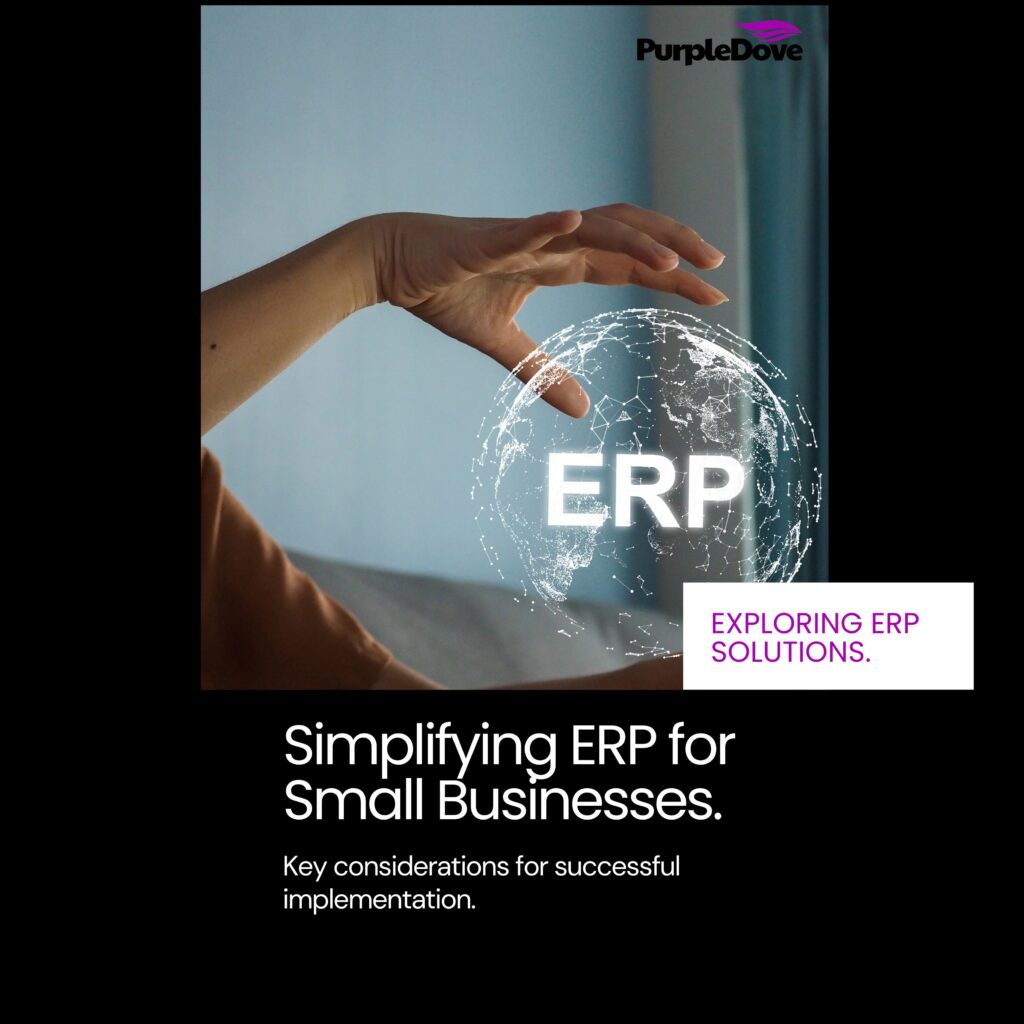Small businesses are likely to face major and minor challenges from time to time especially in managing limited resources to scaling daily operations efficiently. Enterprise Resource Planning (ERP) solutions offer a comprehensive approach to managing core business processes, but navigating the options available can be daunting. In this guide, we’ll explore everything you need to know about ERP solutions for small businesses, from understanding their benefits to choosing the right system and implementing it successfully.
ERP solutions are integrated software systems that help small businesses manage and automate key business functions, such as finance, human resources, inventory management, and customer relationship management (CRM). Unlike traditional business management systems, ERP solutions offer a centralised platform that allows small businesses to streamline daily operations, improve efficiency, and make data-driven decisions.

Choosing the Right ERP System
When selecting an ERP system for your small business, it’s essential to consider factors such as scalability, functionality, ease of use, and cost. Evaluate different ERP vendors and their offerings to find a solution that aligns with your business needs and goals. Look for a system that can grow with your business and adapt to changes in your industry.
Key Features of Small Business ERP Systems
Some key features to look for in an ERP system for small businesses include:
Financial management: Manage accounts payable, accounts receivable, and general ledger.
Inventory management: Track inventory levels, manage orders, and optimise supply chain processes.
Human resources: Streamline payroll, benefits administration, and employee management.
CRM: Manage customer relationships, track sales opportunities, and improve marketing efforts.
Reporting and analytics: Generate insights from real-time data to make informed decisions.
Implementing ERP Solutions in Small Businesses
Implementing an ERP system requires careful planning and execution. Start by defining clear objectives and goals for the implementation process. Engage key stakeholders and end-users throughout the process to ensure buy-in and adoption. Provide comprehensive training and support to help employees learn how to use the new system effectively. Monitor progress closely and make adjustments as needed to ensure a successful implementation.
Benefits of ERP Solutions for Small Businesses
The benefits of ERP solutions for small businesses are numerous:
Improved efficiency: Streamline business processes and eliminate manual tasks.
Better decision-making: Access real-time data and insights to make informed decisions.
Scalability: Grow your business without worrying about outgrowing your ERP system.
Cost savings: Reduce operational costs and improve productivity.
Enhanced customer service: Provide better service and support to your customers.
Cost Considerations and ROI
While implementing an ERP system requires an initial investment, the long-term benefits often outweigh the costs. Consider factors such as licensing fees, implementation costs, training expenses, and ongoing support when budgeting for an ERP solution. Calculate the potential return on investment (ROI) to determine the financial impact of implementing an ERP system for your small business.
FAQs About ERP Solutions for Small Businesses
1. Q: How long does it take to implement an ERP system for a small business?
A: The duration of ERP implementation can vary depending on the complexity of the system and the readiness of the organisation.
2. Q: What are the common challenges faced by small businesses during ERP implementation?
A: Common challenges include resistance to change, data migration issues, lack of adequate training, and budget constraints. However, with proper planning and support, these challenges can be overcome.
Q: How much does an ERP system cost for a small business?
A: The cost of an ERP system for a small business can vary widely depending on factors such as the vendor, the complexity of the system, and any additional features or customisations required.
Q: What are the advantages of cloud-based ERP systems for small businesses?
A: Cloud-based ERP systems offer flexibility, lower upfront costs, and scalability. They also provide easier access to updates and support
Conclusion
Navigating ERP solutions for small businesses requires careful consideration and planning, but the benefits of implementing an ERP system can be significant. By understanding the key features, choosing the right system, and implementing it successfully, small businesses can streamline operations, improve efficiency, and drive growth in today’s competitive market. Find the link to book a demo session with us on how to get started
